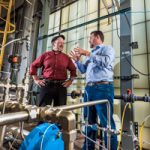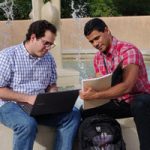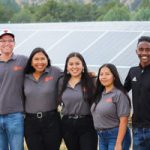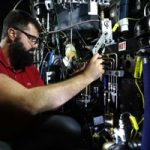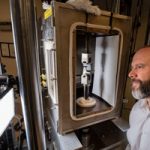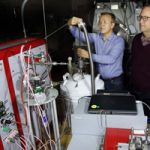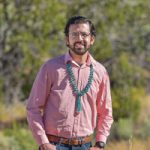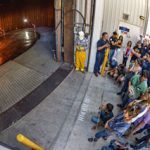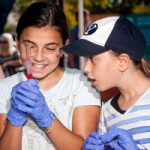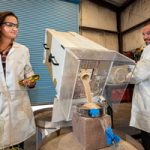Power plants get watered down
Electricity production is one of the industries that uses the most water in the country each day. Sandia researchers are helping the largest power plant in the U.S. identify the most efficient and cost-effective strategies to reduce water use. They have developed a first-of-its-kind comprehensive system dynamics analysis that can show power plants which wet cooling systems can save them money.
Internships fuel research for Puerto Rico engineering students
The NNSA-sponsored Consortium for Integrating Energy Systems in Engineering and Science Education internship program connects engineering students from five Hispanic-serving institutions, including UPRM, with research at Sandia and the National Energy Technology Laboratory in Morgantown, West Virginia.
‘I do have a place’
Sherralyn Sneezer is one of four students who interned at Sandia this summer through the DOE Indian Energy Internship Program. As we observe Native American Heritage Month this November, the Lab News spoke with Sherry about her experience at Sandia and her plans for the future.
Fuel property put to the test at Sandia’s CRF
Researchers at Sandia’s Combustion Research Facility are working to understand the fundamentals of phi-sensitivity, a key fuel property that represents how the autoignition reactivity of the fuel varies with the fuel/air equivalence ratio. This will help increase the efficiency and facilitate the development of practical low-temperature gasoline combustion engines.
Engineering success through predicting failure
Around the world, materials scientists and engineers are trying different ways to predict fractures in ductile metals, but it’s not clear which approach is most accurate. To compare the different methods, Sandia researchers have presented three voluntary challenges to their colleagues: Given the same basic information about the shape, composition and loading of a metal part, could they predict how it would eventually fracture?
Lowering the bar for hydrogen-powered technology
The Hydrogen Materials Advanced Research Consortium, or HyMARC, a multilab collaboration co-led by Sandia, is developing two types of hydrogen storage materials to meet challenging energy density targets set forth by DOE. The newly expanded collaboration is using the most promising strategies to optimize the materials for future use in vehicles.
American Indian Science and Engineering Society recognizes early-career Sandian
Geoscience engineer Dylan Moriarty has been named the 2019 Most Promising Engineer or Scientist by the American Indian Science and Engineering Society. The award is given to an American Indian, Alaska Native, Native Hawaiian, Pacific Islander, First Nations or other indigenous person of North America with less than five years of work experience since his or her last degree.
Record-breaking crowds attend Sandia’s New Mexico Family Day
Family and friends walked the usually restricted streets of Sandia’s Albuquerque campus during the Sept. 7 Family Day event, to show support for their loved ones and see where they work. The long tradition of Family Day is an opportunity to show friends and loved ones some of the interconnected teamwork and facilities they don't usually get to see.
California site celebrates Family Day
More than 2,000 people spread out across Sandia’s California campus for Family Day on Sept. 14, getting a glimpse of the exceptional work done in the national interest by Sandia researchers and professionals from all over the world.
Containing a nuclear accident with ground-up materials
Sandia researchers are developing a promising new way to contain the hot molten mass that develops within a nuclear reactor during a catastrophic accident and prevent the spread of radioactive contamination.
